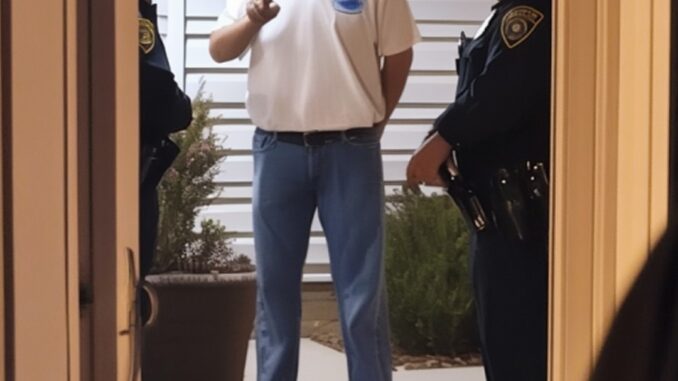
It began like any ordinary morning: a quiet goodbye at my father’s grave. But by the following day, I found myself in a police station, accused of a crime I didn’t commit. All because of a single act of kindness toward a grieving blind woman.
Grief has a strange way of warping time. Days stretch endlessly, yet every memory feels painfully sharp. It had been six months since my father’s passing, and while life continued, the ache of loss lingered. My solace came from visiting his grave weekly, sharing the words I could no longer say in life.
That morning, the air was crisp, carrying the faint rustle of leaves from towering oaks. Standing at his grave, I clutched a bouquet of white lilies—his favorite.
“Goodbye, Dad,” I whispered, brushing away a tear.
As I turned to leave, I noticed a frail figure a few rows away, standing near a freshly turned grave. She was an elderly woman dressed in black, leaning on a white cane. Her dark glasses shielded her eyes, but the curve of her shoulders spoke volumes.
“Excuse me, ma’am,” I said gently, walking toward her. “Do you need any help?”
She tilted her head toward my voice and gave a faint smile. “Oh, thank you, dear. If it’s not too much trouble, could you walk me home? My sons were supposed to pick me up, but… well, they must have forgotten.”
Forgotten? Anger flickered within me. Who leaves their blind mother stranded at a cemetery?
“Of course,” I said, offering my arm. “I’d be happy to help.”
Her name was Kira, and as we walked, she shared that her husband, Samuel, had passed away just days earlier.
“He was my everything,” she said, her voice breaking. “Forty-two years of marriage, and now… now I don’t know how to go on.”
I squeezed her arm lightly. “I’m so sorry for your loss.”
Her grief ran deep, but there was bitterness too. “My sons—Ethan and Mark—they didn’t even wait for me. Samuel always said they’d be the death of me, but I never wanted to believe him.”
Her words hinted at family fractures, but I didn’t press.
When we reached her modest brick home, she invited me in for tea. The warmth of her house, adorned with faded photographs, stood in stark contrast to her somber mood. One picture caught my eye—a younger Kira and her husband, their hands intertwined in front of the Eiffel Tower.
As she brewed the tea, she mentioned Samuel’s habit of installing security cameras around the house. “He didn’t trust the boys,” she said, shaking her head. “He always worried they cared more about what we had than about us.”
Her comment stayed with me as I left, promising to check in soon.
The next morning, loud banging on my door jolted me awake. Groggy, I opened it to find two furious men and a police officer.
“That’s her!” one of the men barked, pointing at me.
The officer turned to me. “Ma’am, are you acquainted with a woman named Kira?”
“Yes,” I replied, confused. “I walked her home from the cemetery yesterday.”
The younger man sneered. “And then you robbed her blind?”
“What?” I gasped. “I would never—”
But they weren’t listening. The officer explained I needed to come to the station to resolve the accusations. Panic rose in my chest as I grabbed my coat.
At the station, Kira was waiting, her cane resting beside her. Her face brightened when she saw me.
“Thank goodness,” she said, reaching for my hand. “I told them you didn’t do it.”
“Then why am I here?”
Her sons, standing nearby, shifted uneasily.
“They accused her because they’re greedy,” Kira said sharply. “Samuel installed cameras, remember? I told the officer to check them.”
The officer looked intrigued. Within an hour, footage from Kira’s home cleared me. It showed me helping Kira and leaving shortly after. Then, the damning part: her sons rummaging through drawers and taking cash and jewelry.
“You idiots,” Kira muttered as her sons stammered excuses. The officer wasn’t convinced. They were arrested for theft and filing a false report.
“I’m so sorry, dear,” Kira said, gripping my hand after the ordeal. “Samuel always warned me about them, but I didn’t want to see it.”
In the weeks that followed, I visited Kira often. We forged an unlikely bond, one born out of grief, betrayal, and shared understanding.
“Sometimes,” Kira mused one afternoon, “the family you choose is better than the one you’re born with.”
Her words stayed with me as I walked home under the setting sun. In her, I found a sense of family—and a reminder that even in the darkest times, unexpected connections can light the way.
Leave a Reply